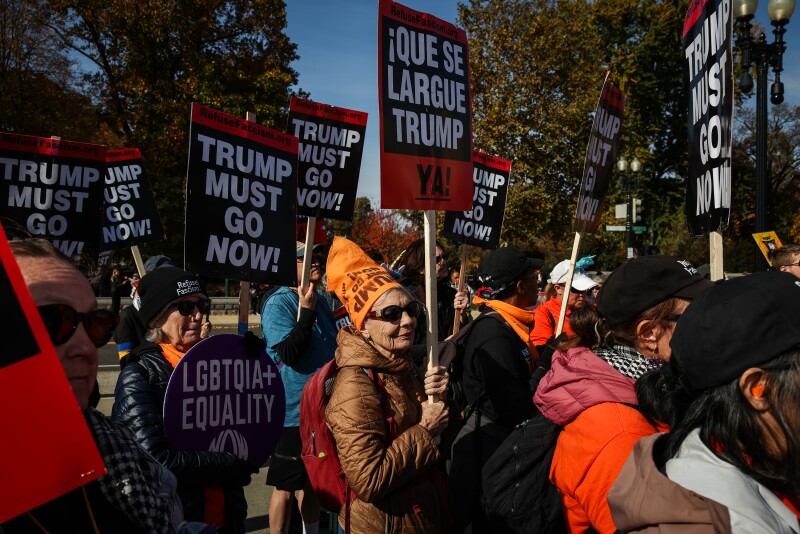Politics
Supreme Court Upholds Same-Sex Marriage Rights Amid Challenges

The United States Supreme Court has reaffirmed its commitment to same-sex marriage rights by declining to hear a petition from former Kentucky county clerk Kim Davis. This decision, announced on Monday, ensures that the landmark ruling of Obergefell v. Hodges (2015) remains intact, alleviating concerns that constitutional protections related to marriage might be reconsidered under the current administration led by President Donald Trump.
Davis had sought to challenge the Supreme Court’s earlier ruling, which legalized same-sex marriage nationwide. In 2015, she refused to issue marriage licenses to same-sex couples, citing her personal beliefs. This refusal led to her being held in contempt of court and spending time in jail. Ultimately, her office was compelled to comply with the law and she was ordered to pay damages.
The underlying issue in Davis’ case was not her faith, but the legal obligation of public officials to uphold the rights guaranteed by the Constitution. As Justice Anthony Kennedy wrote in the majority opinion of Obergefell, “It would misunderstand these men and women to say they disrespect the idea of marriage… They ask for equal dignity in the eyes of the law.” This statement underscores the principle that the Constitution mandates equal treatment for all individuals under the law.
Legal Precedents and State Rights
Critics of the Obergefell decision expressed concerns that the ruling undermined states’ rights to legislate marriage. While these dissenting justices raised valid points, it is essential to recognize that civil rights should not be subject to the approval of the majority. The rights that same-sex couples now enjoy—such as tax benefits, property rights, child custody considerations, and participation in medical decisions—should not be denied based on sexual orientation.
Illinois was among the pioneering states to recognize same-sex marriage, legalizing civil unions in 2011 and full marriage equality in 2013. The swift acceptance of these rights highlights the ongoing journey toward equality and the fragile nature of these legal protections.
The Supreme Court’s rejection of Davis’ appeal signifies a robust endorsement of the rights affirmed by Obergefell, and the absence of public dissent among the justices signals a unified stance. This outcome is a positive development for advocates of civil liberties.
As the nation reflects on this ruling, it is clear that the fight for equal rights continues. Upholding the principle that civil law must remain distinct from religious beliefs is crucial. Everyone deserves the freedom to live according to their faith, but this cannot come at the expense of another’s rights.
This editorial reflects the views of the Chicago Tribune Editorial Board. Feedback can be sent to [email protected].
-

 Science4 weeks ago
Science4 weeks agoInterstellar Object 3I/ATLAS Emits Unique Metal Alloy, Says Scientist
-

 Science4 weeks ago
Science4 weeks agoResearchers Achieve Fastest Genome Sequencing in Under Four Hours
-

 Politics4 weeks ago
Politics4 weeks agoAfghan Refugee Detained by ICE After Asylum Hearing in New York
-

 Business4 weeks ago
Business4 weeks agoIconic Sand Dollar Social Club Listed for $3 Million in Folly Beach
-

 Health1 month ago
Health1 month agoPeptilogics Secures $78 Million to Combat Prosthetic Joint Infections
-

 Business4 weeks ago
Business4 weeks agoMcEwen Inc. Secures Tartan Lake Gold Mine Through Acquisition
-

 Lifestyle4 weeks ago
Lifestyle4 weeks agoJump for Good: San Clemente Pier Fundraiser Allows Legal Leaps
-

 Science4 weeks ago
Science4 weeks agoMars Observed: Detailed Imaging Reveals Dust Avalanche Dynamics
-

 Health4 weeks ago
Health4 weeks agoResearcher Uncovers Zika Virus Pathway to Placenta Using Nanotubes
-

 World4 weeks ago
World4 weeks agoUS Passport Ranks Drop Out of Top 10 for First Time Ever
-

 Entertainment4 weeks ago
Entertainment4 weeks agoJennifer Lopez Addresses A-Rod Split in Candid Interview
-

 Business4 weeks ago
Business4 weeks agoSan Jose High-Rise Faces Foreclosure Over $182.5 Million Loan









